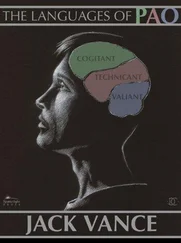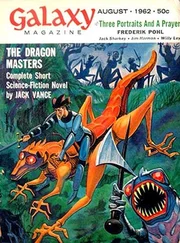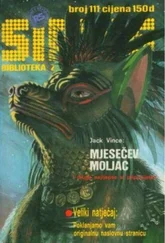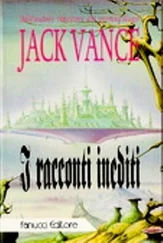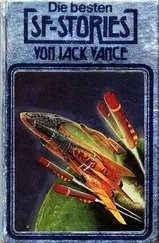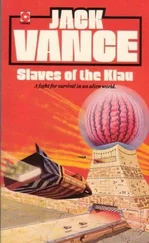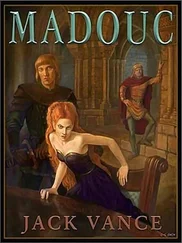“We’d ride out of here due east as fast as we could make it.”
Glystra shook his head. “I can’t do it, Corbus.”
“There’s something fishy going on.”
“I know it. I’ve got to make sure what it is. I’m fighting a lost cause now… You can still drift back to Kirstendale.”
Corbus grunted.
They climbed into the saddles, rode toward the dome.
The air was full of lazy sounds: the far bird-like trill, a hum of small insects, the rustle of warm wind. They passed a clump of gardenia trees; here stood a girl playing with a diabolo. She had a triangle face, big dark eyes; she wore green satin trousers and red slippers. Wordlessly she watched them pass, mouth a little parted, her toy forgotten, and contemplating her shining cleanliness Glystra became warmly aware of his own bristling filth.
They rode out of range of the girl’s curious eyes, past a low wall topped with spheres of polished stone overgrown with colored lichen. Behind came the sound of soft singing. The wall merged into the side of the main dome; skirting the building they rode down a neat lane. A ditch with clean water flowed to the left; to the right was a line of small shops. It was a bazaar like hundreds of others Glystra had passed through while travelling among the stars.
Rugs, shawls, quilts hung over rods; fruits and melons lay heaped in neat pyramids; pottery crocks and vessels lay stacked, their glaze misted by a film of dust; baskets hung from ropes. No one heeded them as they rode past on the moaning zipangotes. In the shadows a few heads were turned and Glystra saw the flash of eyes, but there were no voices raised to greet or sell.
One shop, slightly larger than the others, displayed a wooden sword as a guild-mark. Glystra pulled up his mount. “I’ve got an idea.” He slid free a pair of the swords they had taken from the Rebbirs, carried them into the dimness of the shop.
A short fat man leaning against a heavy table looked up. He had a big pale head, black hair shingled with gray, a sharp nose and chin, the face of a Rebbir changed and rendered devious by civilization.
Glystra flung the swords down on the table. “What are these worth to you?”
The fat man looked at them and his face changed. He did not try to conceal his interest. “Where did you get these?” He reached out, gingerly felt the metal. “These are the finest steel… None but the South Rebbir hetman carry steel like this.”
“I’ll part with them cheap,” said Glystra.
The armourer looked up with quick light in his eye. “What is your wish? A sack of peraldines? A four-tier helmet, mother-of-pearl perhaps, crowned by a Magic Mountain opal?”
“No,” said Glystra. “It’s easier than that. An hour ago my woman was taken into the big dome, or temple, whatever you call it. I want her back.”
“Two steel swords for a woman?” demanded the merchant incredulously. “Do you joke? I’ll furnish you fourteen virgins beautiful as the morning sun for the two swords.”
“No,” said Glystra. “I want this particular woman.”
The merchant absent-mindedly felt of his neck, stared into the shadow of his shop. “In truth, I covet the swords… And yet I own but one head.” He stroked the shiny metal with a reverent hand. “Still—each of these blades represents a thousand heads—a thousand bits of iron, melted and annealed, cleared of dross, heated and quenched, honed for half a year.” He picked up one of the swords. “The Dongmen are unpredictable; at times they seem foolish and old, and then one hears of their craft and cruelty, so that an honest man never knows what to believe”
Glystra fidgeted. Time was passing; minutes kneaded dull fingers into his mind. Nancy—his mind wavered sidewise into the possibilities. Thenfa floor of hardness seemed to rise up under his misgivings. Suppose she were bedded, raped; if that were the worst, there was no irreparable harm done… Possibly she might be allowed a respite. One hour, two hours? Perhaps bathed, perfumed, clothed? It all depended upon the fastidiousness of her captor.
He became aware of the merchant’s calculation. “Well?”
“Just exactly what do you want of me?”
“I want this woman. She is young and beautiful. I imagine she has been taken to someone’s private chamber.”
With an expression of surprise at his ignorance, the merchant shook his head. “The priests are celibate. Only the hierarchs allowed themselves the use of women. More likely she has been taken to the pens.”
“I know nothing of the temple,” said Glystra. “I want the help of someone who does.”
The merchant nodded. “I see. You want help. You’ll risk your own head then?”
“Yes,” said Glystra angrily, “but drop the idea that you won’t be risking yours along with me.”
“I won’t,” said the merchant coolly. “But there is one who will.” He pushed with his foot under the counter. A moment later a chunky young man with a face harder and bonier than his father’s entered the room. His eyes fell on the swords; he uttered a sharp exclamation, took a step forward, halted, looked at Glystra.
“My son Nymaster,” said the merchant. He turned to the young man. “One of the blades is yours. First you must take this man through Nello’s crevice into the temple. Wear robes, take an extra robe with you. This man will point out a woman he wants; no doubt she’ll be in the pens. You will bribe Koromutin. Promise him a porphyry dagger. Bring the woman back outside.”
“Is that the all of it?”
“That’s everything.”
“Then the blade is mine?”
“The blade is yours.”
Nymaster turned, motioned to Glystra with an air of calm execution. “Come.”
“One moment,” said Glystra. He went to the door. “Corbus.”
Corbus slouched into the room, looked around expressionlessly.
Glystra pointed to the two blades. “If I return with Nancy, this man receives the two swords. If neither of us returns—kill him.”
The merchant voiced an inarticulate protest. Glystra glared at him, “Do you think I trust you?”
“Trust?” said the merchant with a puzzled expression. “Trust? What word is that?” And he tested it several times more.
Glystra gave Corbus a wolfish grin. “If I don’t see you again—good luck. Set yourself up as an emperor somewhere.”
The merchant conferred earnestly with his son, gesticulating with the palm of one hand. The son wore a subdued expression.
Nymaster beckoned to Glystra; they left the shop, walked around the building, entered an alley between two fences over which fern fronds fell. Nymaster stopped at a little shed. He pressed heavily on one foot, the door swung open. He reached in, tossed a bundle to Glystra. “Wear this.”
It was a white gown with a tall peaked hood. Glystra pulled it over his head. “Now this,” said Nymaster—a maroon sleeveless smock an inch shorter than the first garment. “And this”—a loose gown of black still shorter, with a second hood.
Nymaster dressed himself similarly. “It’s the wear of a Dongman Ordinary—a lay priest. Once inside the temple no one will look at us.” He tied a third set of robes into a neat bundle, looked up and down the alley. “This way— quickly,”
They ran a hundred feet to a portal in the fence, passed through into a rank garden of fern. The ground was marshy and quivered underfoot. The ferns crackled and snapped in the wind.
Nymaster halted, then stole forward carefully, stopped once more, held out a hand admonishing silence. Looking past him, through a screen of wire vine, Glystra saw a tall spindly man with a gray concave face and a crooked nose standing idly in the sunlight. He carried a quirt in a long gnarled hand, which he slapped idly against his black boots. A little distance away six children of varying ages squatted in a truck garden, grubbing weeds with sharp sticks. Their ankles were knotted together with greasy twine, their only garment was a loose smock of coarse cloth.
Читать дальше


